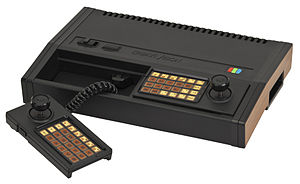CreatiVision

VTech Vision
|
|
| Manufacturer | VTech |
|---|---|
| Type | Home video game console |
| Generation | Second generation |
| Release date | 1982 (Hong Kong) |
| Discontinued | Early 1986 |
| CPU | Rockwell 6502 @ 2 MHz |
| Storage | cassette tape |
| Removable storage | cartridge |
| Controller input | joystick/membrane keypad controllers |
| Successor | VTech Laser 2001 |
The Video Technology CreatiVision is a hybrid computer and home video game console introduced by VTech in 1981 and released in 1982. The hybrid unit was similar in concept to computers such as the APF Imagination Machine, the older VideoBrain Family Computer, and to a lesser extent the Intellivision game console and Coleco Adam computer, all of which anticipated the trend of video game consoles becoming more like low-end computers.
The CreatiVision was distributed in many European countries, in South Africa, in Israel under the Educat 2002 name, as well as in Australia under the Dick Smith Wizzard name. Other names for the system (all officially produced by VTech themselves) include the FunVision Computer Video Games System, Hanimex Rameses and VZ 2000. All CreatiVision and similar clones were designed for use with PAL standard television sets, except the Japanese CreatiVision (distributed by Cheryco) which was NTSC and is nowadays much sought after by collectors.
The CreatiVision console sported an 8-bit Rockwell 6502 CPU at a speed of 2 MHz, 1KB of RAM and 16KB of Video RAM, and had a graphics resolution of 256 × 192 with 16 colors and 32 sprites. The console had 2 integrated joystick/membrane keypad controllers (much like the ColecoVision and Atari 5200) which, when set in a special compartment on top of the console, could be used as a computer keyboard. The CreatiVision had interfaces for a cassette player, an extra rubber keyboard, floppy disk drive, parallel I/O interface, modem (likely unreleased), Centronics printer and one memory expansion module for use with the Basic language cartridge.
...
Wikipedia
